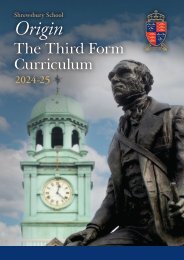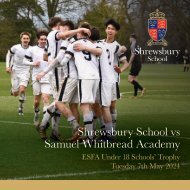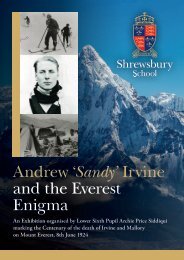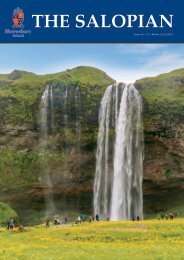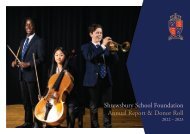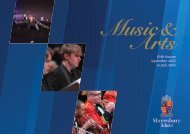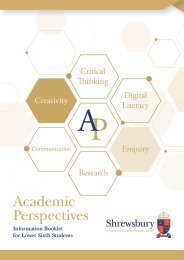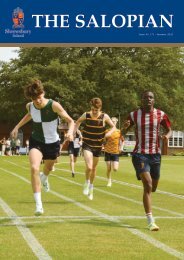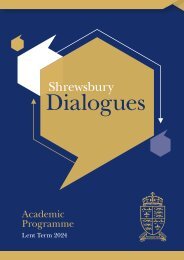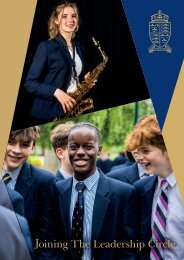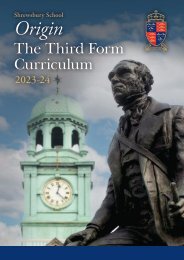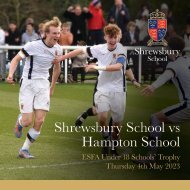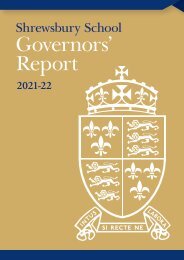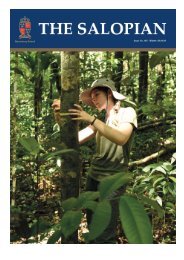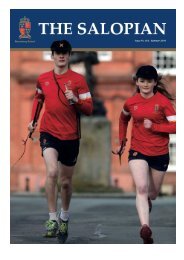The Salopian no. 157 - Winter 2015
Create successful ePaper yourself
Turn your PDF publications into a flip-book with our unique Google optimized e-Paper software.
OLD SALOPIAN NEWS 83<br />
he was appointed to Shrewsbury by Wolfenden in 1948.<br />
It is his work in Chapel and religious teaching that should be<br />
recorded first: it was a contribution of the utmost importance<br />
to the life of the School Community. <strong>The</strong>re was in that<br />
sphere of School life more change in his time than perhaps<br />
in any other: there was uncertainty and experiment, and the<br />
ministries of four successive Chaplains differed in their styles<br />
and emphases. Throughout that time Michael stood firm<br />
and resolute. His faith was clearly proclaimed; the standards<br />
by which he lived were plain for all to see; and he did <strong>no</strong>t<br />
hesitate to speak up for what he believed to be right, even if<br />
sometimes unpopular.<br />
For ten years he was Housemaster of Oldham’s, <strong>no</strong>t the easiest<br />
of years – 1962 to 1972 – when the School was experiencing<br />
both the difficulties caused by the changing mores of British<br />
Society in the 1960s and also the force of the reforming energy<br />
of Donald Wright. Many old members of the House will testify<br />
to his pastoral care and thoroughness, and perhaps above all<br />
to the security of k<strong>no</strong>wing that there was a steady hand at the<br />
helm. One of his Heads of House was Michael Proctor, <strong>no</strong>w<br />
Provost of King’s College, Cambridge. His boys will remember<br />
too with gratitude all the work done by his wife Jane in those<br />
final years of House catering, when Housemasters’ wives<br />
were still hotel keepers at a time when hotel staff had become<br />
almost extinct. He had met Jane Taylor when in his earlier<br />
days he was resident House Tutor in School House, where<br />
her father Tom Taylor was Housemaster from 1948 until his<br />
sudden untimely death in 1952. He and Jane married in 1953.<br />
In other ways too Michael played his full part in School life.<br />
In the Sixth Form his Divinity teaching pointed a path for<br />
many to follow into an understanding of the Christian faith,<br />
and below the Sixth his teaching as a form master raised the<br />
morale of the strugglers and brought results which surprised<br />
even the boys themselves. Michael was also an energetic<br />
House rowing coach, he sang regularly in the Concert Choir,<br />
he was in demand as a football referee who could be relied<br />
on to keep a firm grip on the game, and he was a major link<br />
between the School and Shrewsbury House in Everton, where<br />
he was a familiar and much respected figure.<br />
On retirement Michael and Jane moved to Bayston Hill, where<br />
he had already become involved in parish affairs. His energy<br />
was still undiminished, and in retirement as a <strong>no</strong>n-stipendiary<br />
curate he joined the vicar in fostering a flourishing parish.<br />
<strong>The</strong> congregation outgrew the small village church, and they<br />
raised the money to build a large new church more central<br />
to the modern housing. Those were happy and fruitful<br />
years. As he wrote at the time: “We are trying to combine<br />
faithfulness to the unchanging truths of the Gospel with<br />
courage to experiment with contemporary ways of worship<br />
and communication.”<br />
Also in retirement, he and Jane went regularly to Jerusalem<br />
for two or three months at a time to take his turn as chaplain<br />
at the Garden Tomb, ministering to the many pilgrims and<br />
tourists who visit. In total they did thirteen spells of duty<br />
there. When Michael died, Jane received a phone call from an<br />
Arab street vendor in Jerusalem who spoke to her for twenty<br />
minutes in tribute: Michael’s influence extended beyond the<br />
bounds of the Garden Tomb itself.<br />
In his last years he became increasingly frail and was cared<br />
for and nursed with unstinting devotion by Jane, so that with<br />
the help of visiting professional carers he spent almost all that<br />
time in his own home rather than in hospital. He leaves his<br />
widow Jane, two daughters, a son, five grandchildren and<br />
three great-grandchildren.<br />
Luther’s words spoken at the Diet of Worms in 1521 could<br />
aptly be applied to Michael: Hier stehe ich. Ich kann nicht<br />
anders. Gott helfe mir.<br />
Glynn Yeoward (I 1944-48)<br />
Glynn was one of the more senior members of an<br />
extended ‘<strong>Salopian</strong>’ family. He followed his father Cyril<br />
Herbert and cousins Michael and Richard Ainsworth to<br />
Shrewsbury. Michael was one of Shrewsbury’s more<br />
prominent cricketers, and Glynn felt it was a hard act to<br />
follow. Subsequently, he was joined by younger brother<br />
John Cyril (later High Sheriff of Shropshire c.1982), sons<br />
Robin (I 1968-73) and Andrew (I 1970-75), and grandson<br />
Christopher (O 2007-09).<br />
In 1953, he married Susan Isobel Garbett, niece of the then<br />
Archbishop of York, and is survived by three children,<br />
Robin, Andrew and Sarah, and three grandchildren,<br />
Georgina, James and Christopher.<br />
Glynn’s main loves and achievements at school were football<br />
and cricket. He was in the 2nd XI football and was in the 1st<br />
House final winning team one year, playing in the forward<br />
line with Robin Moulsdale. He claimed on the same evening<br />
to have fought in the 1st House boxing final, losing against<br />
Brian Hutton, later Lord Hutton (of Iraq Inquiry fame).<br />
After achieving his School Certificate, he joined the<br />
Coldstream Guards for National Service, including guarding<br />
Windsor Castle at the time of HRH Prince Charles’ birth.<br />
Following a brief spell working in Canada, he became a cub<br />
reporter on the Hereford Times, and subsequently became<br />
the news editor in the Birmingham Post. In latter years, he<br />
took to writing, completing a number of books mixing fact<br />
with fiction on subjects such as the Roman occupation of<br />
Shropshire. He continued to play football and cricket (with<br />
Ludlow Cricket Club) for as long as possible, and was a<br />
regular on the Shropshire cricket scene.



